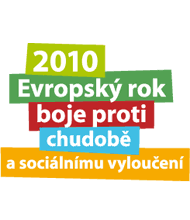Inspired by its founding principle of solidarity, the European Union has joined forces with its Member States to make 2010 the European Year for Combating Poverty and Social Exclusion.
The official documentation claims: "The guiding principle of the 2010 Year is to give voice to the concerns of people who have to live with poverty and social exclusion, and to inspire every European citizen and other stakeholders to engage with these important issues. This Year also aims to challenge stereotypes and collective perceptions of poverty. By harnessing the EU’s principles of solidarity and partnership, 2010 represents a clarion call to tackle the causes of poverty head-on in a bid to ensure everyone can play a full and active role in society. Civil society organisations and social partners will join participating countries and the European Commission to run a series of activities throughout 2010."
In view of the systemic and global crisis and its widespread consequences, poverty and exclusion have become a multi-polar hot spot in European and international politics, as well as in the development of societies. It is an especially explosive subject, and as such deserves professional consideration in which themes and not borders are at stake.
The academic world is not unprepared. Top-ranking experts and academics are engaged in research projects dealing with "exclusion", the "precariate", the "underclass" – to name only a few terms. Debates on causes, effects and consequences show very clearly that treatment of the subject, methodology and approaches to possible resolutions can on the one hand only be understood in a cultural, historical und national context. On the other hand, people are affected by the consequences of a changing world irrespective of their own ideology, religion and citizenship. Poverty has the capacity to change the heart of the European system and challenge existing social standards, progressive welfare for all, and last but not least, peace in the house of Europe.
Social exclusion breeds riots, boosts crime and drug abuse, worsens recruitment options on the labour market and – in combination with demographic change – has a negative impact on the governmental budget.
The Lisbon Treaty has provided a framework that focuses on responsibility and solidarity. Despite all its regulatory requirements, these are the soft skills that appear to be crucial to combat poverty and social exclusion.
Conference format
A three-day, international European conference
Objectives of this conference
- Critical, international analysis of subject terminology, context and status, on a trans- disciplinary and multidisciplinary basis
- Presentation of the current status of knowledge and surveys on the subject
- Challenging existing "stereotypes", "dogmata" and causal relations
- Raising awareness and sensitivity for these specific topics
- Stimulating a paradigm shift and a change in concrete action
- Acting as an agent in the implementation of value-based frameworks in the triangle: economy – society – the state
- Promotion of international solidarity, subsidiarity, partnership and the establishment of appropriate platforms
- Inter-institutional and proactive integration of decision-makers
- Development of appropriate and complementary scenarios, solution approaches, strategies and concepts for the future
- Promotion of measures to stabilise or regain an integral and internationally applicable level of prosperity
- Overall: contribution to the sustainability of European integration Proceedings
- Poverty – social exclusion: people – society: Thursday, 30 September 2010
- Poverty – social exclusion: EU – international – national: Friday, 1 October 2010
- Poverty – social exclusion: the scientific dialogue: Saturday, 2 October 2010. Target audience
- Politicians, civil servants, diplomats
- Decision-makers in economics, politics, society, academia, the churches
- Commissioners responsible for poverty, welfare and integration issues in all organisations
- Scientists and futurologists
- European and national educational institutes, centres of excellence and networks
- Pupils, students and educators
- Youth organisations, NGOs
- Journalists and representatives of different media
- All those interested in Europe and its development
Quality assurance
- Project design, organisation and selection of speakers: scientific board and other international bodies and experts
- International monitoring of conference proceedings and achievements
- Publication of conference results in digital and print form
- Promotion of measures to implement conference recommendations Übersetzung: Dr.in Claudia Schlembach, Hanns-Seidel-Stiftung, Münche









